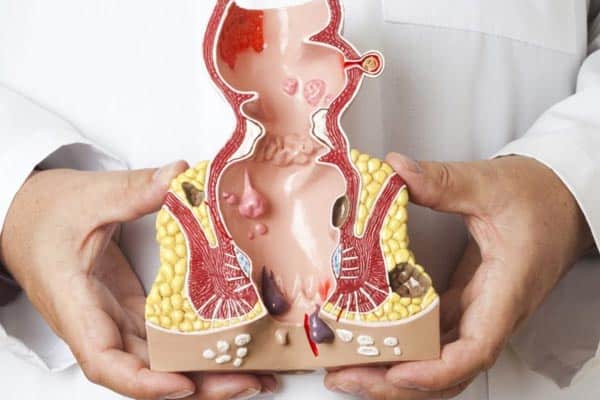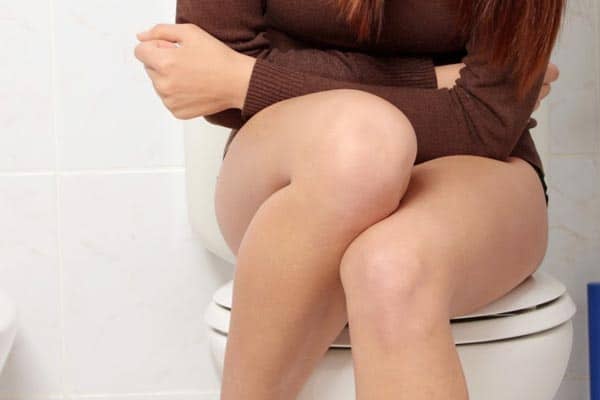Yikes! What is that, and when will it go away? This is probably what went through your mind when you first realized you had hemorrhoids.
Simply put, hemorrhoids or piles are inflamed veins in the rectum and anal area that can cause irritation and bleeding.
How Long Do Hemorrhoids Last?
- Mild hemorrhoids can last from a few days to a few weeks. They may go away on their own, and discomfort can be relieved with over-the-counter treatments like hemorrhoid creams.
- More severe cases can last for months and may require surgery.
As this video demonstrates, some people can have them off and on for years of their lives.
What, Exactly, are Hemorrhoids?
According to the Mayo Clinic, there are three main types of hemorrhoids. Internal hemorrhoids are located inside the rectum and sometimes protrude through the anus.
External hemorrhoids are located beneath the skin around the anal opening. Thrombosed hemorrhoids have filled with blood and a clot has formed within it.
Internal Hemorrhoids
Internal Hemorrhoids are usually painless and cannot be seen. They are very common and nearly 3 out of 4 people will experience them.
Since they are located inside the rectum, bowel movements can aggravate the tissue and cause bleeding. Excessive straining can also force one to come through the anus, and these are called prolapsed hemorrhoids.
Prolapsed Hemorrhoids
As mentioned, these are internal hemorrhoids that have protruded through the anal opening. They have symptoms similar to external hemorrhoids including bleeding, itching, and pain.
They are graded from 1 to 4, depending on the severity of their protrusion.
- Grade 1-No protrusion through the anus
- Grade 2-Some protrusion but will return to the rectum on its own
- Grade 3-Protrusion that must be manually returned to the rectum
- Grade 4-Protrusion blocks bowel movements and cannot be returned to the rectum
External Hemorrhoids
External hemorrhoids are swollen veins under the skin around the anus. They can be felt and seen and can cause itching and irritation. They feel like bumps around the anal opening and can be sensitive to the touch.
Thrombosed Hemorrhoids
Thrombosed hemorrhoids happen when blood collects in external hemorrhoid, developing into a clot.
They are not dangerous but can be extremely painful with swelling and bleeding. It is easily recognized as a hard lump around the anus. These sometimes must be cut open and drained.
What Causes These Nuisances?
Hemorrhoids are caused when the veins around the rectal area stretch, pull and swell when pressure is applied.
They can become more common in old age because our tissues in the anus and rectum begin to abate in strength.
This causes them to stretch, allowing for hemorrhoid development. Specific causes include:
- Pushing too hard during bowel movements
- Sitting on the toilet for too long
- Recurring constipation or diarrhea
- Obesity
- Pregnancy
- Anal sex
- Low-fiber diet
The two common denominators for developing hemorrhoids are straining and increased weight.
This strains the rectal and anal veins. If the activity causing your hemorrhoids is continued, you can expect them to stick around longer.
What Types of Treatments are Available?
Something caused hemorrhoids to develop, so what do you do now? It is important to recognize if they are mild or a more serious type.
Mild cases can usually be treated with at-home remedies. Some more serious, and likely more painful, cases must receive medical attention.
“If you’re having bleeding, it might be hemorrhoid, but it also could be colon cancer,” pediatrician Dr. Jim Sears says. “You’ve got to get it checked out.”
Doctors can diagnose hemorrhoids with a digital exam. This entails using a gloved finger to gently palpate the anus and rectum to feel for an unusual tissue. A visual inspection can be done with an anoscope, proctoscope, or sigmoidoscopy.
Mild Cases
You may only recognize you have internal hemorrhoids if you bleed during bowel movements. These will most likely take care of themselves in a couple of days, but they can last for a few weeks.
Bleeding during bowel movements can be lessened with the help of an over-the-counter stool softener.
If you are experiencing itching or pain, you may have external hemorrhoids. These can be treated with hydrocortisone cream, hydrocortisone suppositories, or witch hazel pads.
These options will soothe irritated tissue. Cold packs may also be used to keep swelling at bay.
You may be able to treat hemorrhoids naturally with items you already have in your cabinets.
Your aloe vera plant is also a source of relief from the irritation. The Natural Society covers some natural remedies for hemorrhoids.
Severe Cases
More severe cases include thrombosed hemorrhoids and grade 4 prolapsed hemorrhoids. They can cause extreme pain, irritation, and block bowel movements.
Uncomfortable as it sounds, visiting a doctor is a good decision. According to American Family Physician, the following are a few methods that can be used to remove a more severe type of hemorrhoid.
Rubber Band Ligation This method uses a small rubber band wrapped around hemorrhoid to cut off blood circulation. It is the most successful method for hemorrhoid removal.
Injection A solution of chemicals is injected directly into hemorrhoid to shrink it. It is not as effective as rubber band ligation.
Coagulation A laser or infrared light causes small internal hemorrhoids to harden and shrivel up.
Recurring Hemorrhoids
Recurring hemorrhoids sometimes must be surgically removed. This is called a hemorrhoidectomy, and it is the best treatment for hemorrhoids that keep coming back.
Under general anesthesia, the tissue is removed. This video better explains this procedure.
Stapling blocks blood flow to hemorrhoid and is another procedure that a doctor must perform. It is generally less painful than surgery.
All Cases
In all cases, a few things can lessen the impact hemorrhoids have on your life. Take plain warm-water baths or sitz baths to keep the anal area clean.
Use gentle wet wipes instead of toilet paper to avoid irritating hemorrhoids further. Over-the-counter pain medication can alleviate discomfort.
Can Complications Occur with Hemorrhoids?
Though rare, complications can happen with hemorrhoids, and it is important to see your doctor if you experience them.
Anemia is one complication caused by continued blood loss from hemorrhoids that bleed profusely. This might be seen with a grade 4 prolapsed hemorrhoid.
Another rare complication is strangulated hemorrhoid. This happens when blood is cut off from the vein and the tissue begins to die.
If surgery was required to remove your hemorrhoid, it is important to carefully heed your follow-up care plan.
With any surgery, there is a risk of infection. Following instructions and taking any prescribed medications can lessen this risk.
Can Treatment make Hemorrhoids go away Quicker?
Barring hemorrhoidectomy, most treatments will not make hemorrhoids go away quicker. Treatments like creams or ointments can help to ease itching and pain.
Though most hemorrhoids will go away on their own, it can take a few weeks to a few months.
Can I Prevent Hemorrhoids?
We have learned that hemorrhoids can last for weeks or even longer if the situation is complicated.
They can be itchy, irritating, or painful. This sounds like something I’d like to avoid at all costs. So, is it possible?
Due to individual physiology, some of us may be unable to completely prevent developing hemorrhoids.
In situations like pregnancy, developing hemorrhoids may be unavoidable as the growing fetus pushes against rectal and anal veins.
Regardless of our predisposition to developing hemorrhoids, there are still some things that can be done to lower the chances of getting them.
According to Everyday Health and medically reviewed by Dr. Pat F. Bass III, incorporating items from below can also lower your risk of developing complications from hemorrhoids.
High Fiber Diet Eating a diet high in fiber increases the ease in which bowel movements happen. This means there is less strain.
Interestingly, too much fiber can cause constipation, making hemorrhoids worse. So it is important to drink a lot of water along with any fiber.
Drink a lot of Liquids As mentioned, fiber can actually back up the colon without water present. Similarly, when the body is dehydrated, the feces can become stuck in the colon.
This means that you have to push harder during bowel movements. This leads to increased pressure and hemorrhoids.
Do Not Strain During Bowel Movements One recurring theme is not to strain or push during bowel movements.
This can cause new hemorrhoids to develop or existing ones to protrude through the anus. A stool softener or laxative can sometimes help with straining.
Exercise Is there anything exercise isn’t good for? Movement keeps the pressure at a minimum. The added bonus of losing body weight can also help permanently reduce it in this area. Maintaining a healthy body weight is beneficial for everyone.
Avoid Sitting for long Periods It makes sense that sitting for long periods adds stress to the anal area.
Whether sitting at your desk at work or in your favorite chair at home, it is wise to stand up and move around regularly.
You can even invest in a stand-up desk so you aren’t sitting for most of your day. Standing and walking regularly can help many conditions beyond hemorrhoids.
Go to the Bathroom Do not hold in bowel movements. Sure, it can be hard to locate just the right place to “go,” and we all know there’s no place like home.
However, holding in bowel movements can quickly lead to constipation. Constipation leads to pushing and straining. Pushing and straining lead to, yes, you guessed it, hemorrhoids!
In the Meantime…
There are steps you can take to make life with hemorrhoids bearable for their duration. Since they can last up to three months, it is imperative to be as comfortable as possible. Here are a few tips to help you live with hemorrhoids.
Keep Hemorrhoids from Progressing
When wiping after bowel movements, use unscented or sensitive skin baby wipes instead of dry toilet paper.
Toilet paper can be abrasive and cause bleeding to worsen. In the shower, use unscented soaps, shower gels, or even baby shampoo. Harsh chemicals and perfumes in regular soaps can irritate hemorrhoids.
Treat the Symptoms
Pain, itching, and another discomfort can be minimized with over-the-counter medications. Hydrocortisone creams are effective at stopping hemorrhoids from itching.
Anti-inflammatories including naproxen and ibuprofen can help to reduce swelling and pain.
Ice packs and witch hazel pads also help to reduce swelling. Warm baths and sitz baths are effective for cleaning between bowel movements.
Bedrest, Sitting, and Proper Attire
For most of us, it would be impossible to not sit down for the duration of our hemorrhoids. Ideally, lying on your stomach or side is the best way to keep pressure from building up.
If sitting is inevitable, you may use a special “donut” pillow to alleviate strain in the anal area.
These pillows, as their name indicates, are shaped like a donut and are made especially for these conditions. A regular pillow can also reduce pressure if you do not have a donut pillow.
Refrain from lifting heavier items and from participating in any activity that could cause you to strain.
Always wear cotton or moisture-wicking underwear to keep the area dry. Loose clothing is another way to keep dry.
Sweat can irritate hemorrhoids.


